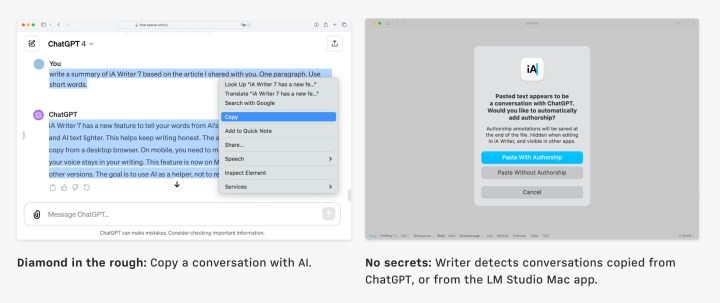
In a year where virtually every tech company in existence is talking about AI, Apple has been silent. That doesn’t mean Apple-focused developers aren’t taking matters into their own hands, though. An update to the the popular Mac writing app iA Writer just made me really excited about seeing what Apple’s eventual take on AI will be.
In the iA Writer 7 update, you’ll be able to use text generated by ChatGPT as a starting point for your own words. The idea is that you get ideas from ChatGPT, then tweak its output by adding your distinct flavor to the text, making it your own in the process. Most apps that use generative AI do so in a way that basically hands the reins over to the artificial intelligence, such as an email client that writes messages for you or a collaboration tool that summarizes your meetings.
Things are a little different with popular writing app iA Writer, though — and the result is a nuanced and ethically minded take on generative AI that feels like something Apple could end up doing itself.
“Working responsibly with AI”
So, here’s how it works. Any text pasted from ChatGPT is grayed out by iA Writer. Any text that you change or replace turns black, indicating that you have written it yourself. The developer of iA Writer says this will turn ChatGPT into a “dialogue partner” rather than a ghostwriter, where there’s a risk that “it takes over and you lose your voice.”
The app won’t automatically recognize pasted text as coming from ChatGPT, though — you have to mark it yourself by right-clicking and selecting Paste As > AI > Enable Authorship. There are also options for marking pasted text using keyboard shortcuts and menus.
If you leave the writing app and ask ChatGPT to edit a paragraph created in iA Writer, you can let the app know by right-clicking and choosing Paste Edits From > AI. And if you want to tell iA Writer that the words you are inserting were created by yourself rather than AI, you can select Paste As > Me.
The developer of iA Writer says that assigning authorship in this way is “new, useful, and prerequisite to working responsibly with AI text generation.” They continued: “We think that everyone would benefit from a future where we can see what the machine processed and what humans felt, thought, and expressed with their hearts and minds.”
All of this means that iA Writer’s update is not designed to detect AI plagiarism. Indeed, the developer says that “it’s up to you to decide how honest you want to be with yourself.” Done properly, though, it could turn ChatGPT into a handy assistant that improves your writing without drowning out your own voice.
The future of Apple AI
This update to iA Writer is starting on macOS, iPadOS, and iOS, but it will be coming to Windows and Android at some point too.
And of course, iA Writer isn’t the only third-party Mac app around, nor will it be the last. But it is a preview of the kind of thing Apple will need to address in full at some point. It has its own first-party apps that are all starting to look a bit outdated compared to its competitors. Google, Adobe, and Microsoft have all embraced generative AI wholesale, integrating it into nearly every piece of software. Windows Copilot is, of course, the supreme example. Apple’s own solution for bringing AI more fully into its products will likely look different — but surely it’ll need to do something.
We’re expecting it to be a major focus at WWDC 2024 next June, where we’ll hopefully see a broader vision of how Apple tackles AI.



